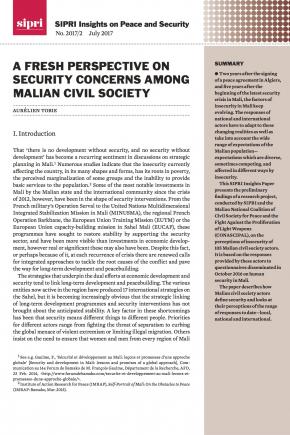A Fresh Perspective on Security Concerns among Malian Civil Society
Two years after the signing of a peace agreement in Algiers, and five years after the beginning of the latest security crisis in Mali, the factors of insecurity in Mali keep evolving. The responses of national and international actors have to adapt to these changing realities as well as take into account the wide range of expectations of the Malian population—expectations which are diverse, sometimes competing and affected in different ways by insecurity.
This SIPRI Insights Paper presents the preliminary findings of a research project, conducted by the Stockholm International Peace Research Institute (SIPRI) and the Malian National Coalition of Civil Society for Peace and the Fight Against the Proliferation of Light Weapons (CONASCIPAL), on the perceptions of insecurity of 105 Malian civil society actors. It is based on the responses provided by these actors to questionnaires disseminated in October 2016 on human security in Mali.
The paper describes how Malian civil society actors define security and looks at their perceptions of the range of responses to date—local, national and international.
I. Introduction
II. Methodology
III. Perceptions of security among civil society in Mali
IV. Security actors and their responses to insecurity
V. Lessons from these initial findings

